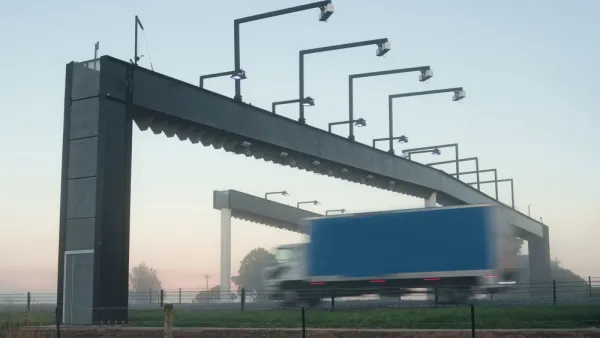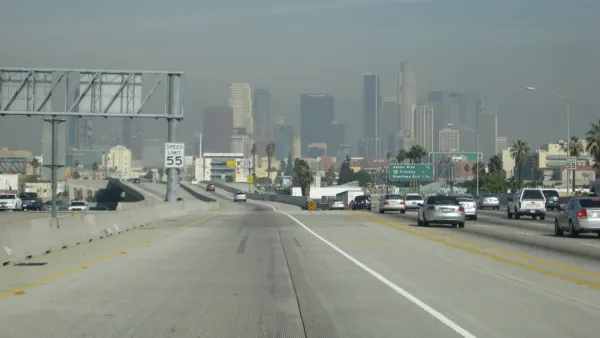What is the future of the "deeply flawed" state gas tax? Lemov Penelope compares the approaches taken by VA and OR - both plan to eliminate it and replace it with alternatives - a state sales tax and a vehicle-miles-traveled (VMT) fee, respectively.
Penelope is not optimistic about the future of the state gas tax.
Every tax has its problems, but the state gasoline tax seems more deeply flawed than most. That's largely because the gas tax in most states isn't indexed to the rising cost of fuel; rather, it sits fixed at a per gallon fee. Meanwhile, cars are becoming more efficient and using less gas. In short, the gas tax has been going broke.
Comparing the plans of Virginia and Oregon has merits as both recognize the dim future of a stagnant gas tax. Of course, a third approach would be to 'fix' the state gas tax - by indexing it to inflation - or by converting the excise tax to a sale tax - or simply by increasing it a few cents, but that approach is not examined, nor mentioned in her piece that looks at two alternatives to the gas tax.
To get a handle on the economics of these diametrically opposed approaches, I talked to George Hoffer, a transportation economist at the University of Richmond. As a Virginian, he follows the Virginia plan closely, but he has also written at length about the Oregon approach (PDF).
Hoffer states, "Traditionally, there's been a link between using roads and highways and paying for them, and Virginia has always financed roads with user fees. But it's a break in other ways. It takes us in a direction that's 180 degrees from where public policy has been taking us since 1974 when the federal government passed the first fuel efficiency standards. The proposal would charge owners of an electric vehicle or hybrid car an additional $100 for the annual registration fee. This would make sense if you were doing a fuel tax but not if you're doing away with the fuel tax."
The Atlantic Cities' Eric Jaffe, calling the VMT fee the "most compelling replacement for the gas tax", provides a close-up look at the 5-option Oregon plan to charge drivers by the mile driven designed to overcome the most serious objection to VMT fees - the use of global positioning systems to track drivers, referred to as privacy concerns.
The five tracking plans vary in terms of oversight. Two are managed by the Oregon D.O.T., three by a third-party vendor.
We have to somehow, some way, have people tell us how many miles they've driven," says Mary Olson, a commissioner at the state's department of transportation, and also a participant in the latest pilot. "If you want to use technology to do that, you run into privacy issues. Some people are very sensitive about that. Other people like me don't care at all. You can't have one solution. You have to have multiple solutions."
Olson offers an opposing view to what Penelope called one of "the most flawed" means of collecting transportation revenue.
"The gas tax is a perfect tax. It's not invasive on the person using it and it requires very little effort on the agency that depends on that money for providing services," says Olson. "Trying to replace that is really difficult, because anything you try to do is so much more complicated than just pulling up to the pump and paying for gas."
Jaffe earlier looked at the 'third approach' to the future of state gas taxes - increasing it. He wrote about plans from Minnesota, Massachusetts, and Maryland and also on the federal level.
All three approaches have their challenges, but do keep an eye on Oregon and Virginia as each is the most advanced in ditching the state gas tax and replacing it with a different transportation funding approach.
FULL STORY: What to Do About the Gas Tax?

Analysis: Cybertruck Fatality Rate Far Exceeds That of Ford Pinto
The Tesla Cybertruck was recalled seven times last year.

National Parks Layoffs Will Cause Communities to Lose Billions
Thousands of essential park workers were laid off this week, just before the busy spring break season.

Retro-silient?: America’s First “Eco-burb,” The Woodlands Turns 50
A master-planned community north of Houston offers lessons on green infrastructure and resilient design, but falls short of its founder’s lofty affordability and walkability goals.

Test News Post 1
This is a summary

Analysis: Cybertruck Fatality Rate Far Exceeds That of Ford Pinto
The Tesla Cybertruck was recalled seven times last year.

Test News Headline 46
Test for the image on the front page.
Urban Design for Planners 1: Software Tools
This six-course series explores essential urban design concepts using open source software and equips planners with the tools they need to participate fully in the urban design process.
Planning for Universal Design
Learn the tools for implementing Universal Design in planning regulations.
EMC Planning Group, Inc.
Planetizen
Planetizen
Mpact (formerly Rail~Volution)
Great Falls Development Authority, Inc.
HUDs Office of Policy Development and Research
NYU Wagner Graduate School of Public Service




























